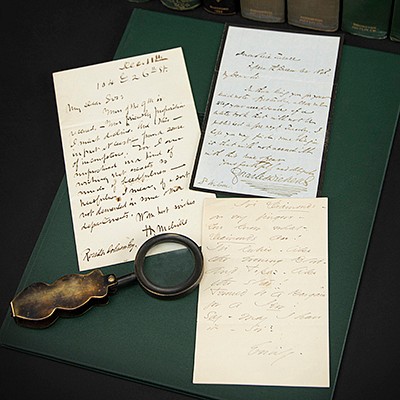John Steinbeck Autograph Letter Signed
Two ways to bid:
- Leave a max absentee bid and the platform will bid on your behalf up to your maximum bid during the live auction.
- Bid live during the auction and your bids will be submitted real-time to the auctioneer.
Bid Increments
| Price | Bid Increment |
|---|---|
| $0 | $5 |
| $50 | $10 |
| $200 | $25 |
| $500 | $50 |
About Auction
Oct 12, 2022
RR Auction support@rrauction.com
- Lot Description
Remarkable ALS in pencil, signed “Love, Father,” two pages, 8 x 12.5, November 10, 1958. John Steinbeck's handwritten draft of a famous letter to his 14-year-old son, Thomas, offering his wise, fatherly advice on matters of the heart. In full:
"Dear Thom:
We had your letter this morning. I will answer it from my point of view and of course Elaine will from hers.
First—if you are in love—that's a good thing—that's about the best thing that can happen to anyone. Don't let anyone make it small or light to you.
Second—: There are several kinds of love. One is a selfish, mean, grasping, egotistical thing which uses love for self importance. This is the ugly and crippling kind. The other is an outpouring of everything good in you—of kindness and consideration and respect—not only the social respect of manners but the greater respect which is recognition of another person as unique and valuable. The first kind can make you sick and small and weak but the second can release in you strength, and courage and goodness and even wisdom you didn't know you had.
You say this is not puppy love. If you feel so deeply—of course it isn't puppy love.
But I don't think you were asking me what you feel. You know better than anyone. What you wanted me to help you with is what to do about it—and that I can tell you.
Glory in it for one thing, and be very glad and grateful for it.
The object of love is the best, and most beautiful. Try to live up to it.
If you love someone—there is no possible harm in saying so—only you must remember that some people are very shy and sometimes the saying must take that shyness into consideration.
Girls have a way of knowing or feeling what you feel, but they usually like to hear it also.
It sometimes happens that what you feel is not returned for one reason or another—but that does not make your feeling less valuable and good.
Lastly—I know your feeling because I have it and I'm glad you have it.
We will be glad to meet Susan. She will be very welcome. But Elaine will make all such arrangements because that is her province and she will be very glad to. She knows about love too and maybe she can give you more help than I can.
And don't worry about losing. If it is right, it happens—The main thing is not to hurry. Nothing good gets away." Steinbeck strikes through a couple of lines and a few words in his handwritten draft. In fine condition. Accompanied by a typed transcript.
The text of this famous letter has been widely circulated in print (see: Steinbeck: A Life in Letters, published by Penguin in 1989) and online, in The Atlantic, Letters of Note, and other blogosphere outlets large and small—these enduring words thus form a bridge between one of America's greatest writers and contemporary pop culture. It is a marvelous exposition of love—what it feels like, what it means, and what it can be. Steinbeck treats his son's revelation in a serious and straightforward manner—perhaps in response to a denial of "puppy love"—and warmly offers a hand in expressing and understanding these newfound feelings. While this letter offers an intimate, private glimpse into Steinbeck's family life, it also expresses his ideas about love with profundity and eloquence. Four years later, in 1962, the great American author would be honored with the Nobel Prize in Literature 'for his realistic and imaginative writings, combining as they do sympathetic humor and keen social perception.' - Shipping Info
-
Bidder is liable for shipping and handling and providing accurate information as to shipping or delivery locations and arranging for such. RR Auction is unable to combine purchases from other auctions or affiliates into one package for shipping purposes. Lots won will be shipped in a commercially reasonable time after payment in good funds for the merchandise and the shipping fees are received or credit extended, except when third-party shipment occurs. Bidder agrees that service and handling charges related to shipping items which are not pre-paid may be charged to a credit card on file with RR Auction. Successful international Bidders shall provide written shipping instructions, including specified Customs declarations, to RR Auction for any lots to be delivered outside of the United States. NOTE: Declaration value shall be the item’(s) hammer price and RR Auction shall use the correct harmonized code for the lot. Domestic Bidders on lots designated for third-party shipment must designate the common carrier, accept risk of loss, and prepay shipping costs.
-
- Buyer's Premium



 EUR
EUR CAD
CAD AUD
AUD GBP
GBP MXN
MXN HKD
HKD CNY
CNY MYR
MYR SEK
SEK SGD
SGD CHF
CHF THB
THB














